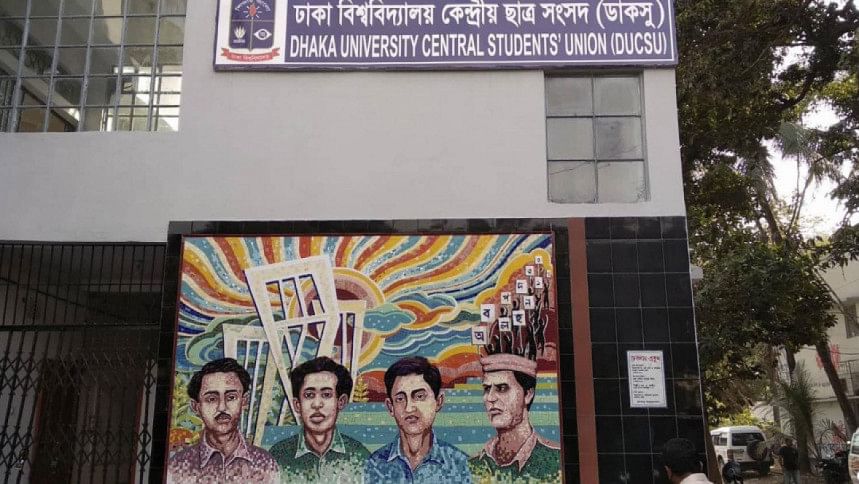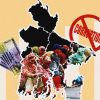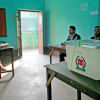DUCSU election will usher in student unity

The night of July 16, 2024 will always be etched in the collective memory of thousands of people. That night, Dhaka University's residential female halls chased away Sheikh Hasina's goons of Bangladesh Chhatra League (BCL). When the student-people movement won and the Awami League government fell on August 5, 2024, the adrenaline rush and resolve of the night of July 16 reverberated. Discussions about the Dhaka University Central Students' Union (DUCSU) election gained new significance in the wake of these historic circumstances. DUCSU has served as a forum for student representation and political participation for many years, but its absence has led to a void. Many student organisations endorse the call for DUCSU election, but this demand is not without disagreements.
The last DUCSU election took place in 2019, shrouded by accusations of vote-rigging, anomalies, and dominance by BCL. While the elected student leaders, including then Vice-President (VP) Nurul Haque Nur, experienced administrative and political hardships in carrying out their duties, several student organisations, notably the leftist organisations and Jatiyatabadi Chhatra Dal, rejected the results.
The Anti-Discrimination Student Movement, initially hailed for its progressive stance and role in mobilising students during the uprising, has seen its image tainted in the aftermath. Their credibility as a force in student politics has been called into question due to accusations of opportunism, internal strife, and dubious partnerships. Among the other student political organisations, Islami Chhatra Shibir is facing renewed criticism regarding its stance on the 1971 Liberation War, a long-standing controversy that has hindered its legitimacy in mainstream student politics. There is controversy surrounding Chhatra Dal, BNP's student wing, as well, especially in the aftermath of the mass uprising. The general students, many of whom are disenchanted with the condition of student politics at Dhaka University, is becoming increasingly frustrated as a result of such conflicts. While student organisations prepare to assert their influence, they have yet to overcome internal controversies and external scrutiny, further complicating the landscape.
The tensions intensify as the call for DUCSU election gains momentum. The university administration's hesitation to take strong action has further fuelled the flames. Some organisations support an autonomous and fully representative DUCSU, while others appear more concerned in concentrating power and widening already-existing divisions on campus. The values of representation, diversity, and true student leadership ought to be crucial for DUCSU's agenda. Though noble in goal, ideological purity frequently shapes this vision and can occasionally alienate those with different viewpoints. On campus, student organisations are still sharply split along organisational, political, and ideological lines, which makes it challenging to bring them together for substantial transformation. Historically, this split has made it easier for the authorities to stifle student demands and postpone important reforms by weakening collective bargaining strength.
The Kabi Sufia Kamal Hall Union's victory over BCL in 2019 showed that students react favourably to reputable, non-partisan leadership that is based on actions that care for their rights. This implies that student governance should represent the whole student body. It is also crucial to assemble a group of student leaders who are credible across ideological divides, make sure that the selection of candidates is transparent, and uphold a common goal that goes beyond immediate electoral triumph.
A proportional representation system in which DUCSU seats are distributed according to each student organisation's vote share is also another option. This model can promote collaboration across ideological differences and stop any single group from controlling all the power. Another alternative is the establishment of issue-based committees. This strategy enables targeted and outcome-oriented action without requiring total consensus on every issue.
In the United States, student union elections are generally conducted annually and candidates often address campus-specific issues like tuition fees, diversity, and student services. Depending on their sociopolitical surroundings and the design of their educational institutions, student unions use various election models all over the world. Proportional representation is used in student unions in many European nations, including the UK. To guarantee representation for all important groups, seats are allocated according to the percentage of votes each party or panel receives. The positive aspect of this is that it promotes cooperation and fairly represents a variety of groups. The intricacy of the vote-counting procedure and the possible challenge of establishing a majority are the drawbacks of this process. In order to maintain inclusivity, certain South African universities permit various groups to alternate in positions of leadership. In DUCSU, a rotating leadership model could be explored, where key positions are shared among different organisations on a time-bound basis. Such an arrangement could foster mutual respect and understanding while ensuring that no single group dominates the decision-making process.
Student organisations need to place the common good before their past grievances in order to realise this vision. Mutual respect, open dialogue, and an allegiance to common values are necessary in this regard. Leaders need to focus on creating a collaborative culture rather than reverting to the divisive strategies of the past. Equally important is the role of the university administration in facilitating a fair and transparent electoral process. Ensuring a level playing field is essential in rebuilding trust.
As the battle lines are drawn, the stakes grow higher. The coming months could prove pivotal in shaping the future of student governance at Dhaka University.
Monira Sharmin is former general secretary, Kabi Sufia Kamal Hall Union, DUCSU 2019. She is currently working as the joint convenor and office secretary of Jatiya Nagorik Committee. She can be reached at [email protected].
Views expressed in this article are the author's own.
Follow The Daily Star Opinion on Facebook for the latest opinions, commentaries, and analyses by experts and professionals. To contribute your article or letter to The Daily Star Opinion, see our guidelines for submission.

 For all latest news, follow The Daily Star's Google News channel.
For all latest news, follow The Daily Star's Google News channel. 








Comments